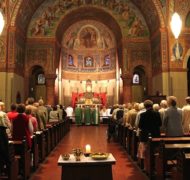Offering God the Products of Our Work (Numbers 4 and 7)
Bible Commentary / Produced by TOW Project
The Lord gives detailed instructions for setting up the tent of meeting, the location of his presence with Israel. The tent of meeting requires materials produced by a wide variety of workers—fine leather, blue cloth, crimson cloth, curtains, poles and frames, plates, dishes, bowls, flagons, lamp stands, snuffers, trays, oil and vessels to hold it, a golden altar, fire pans, forks, shovels, basins, and fragrant incense (Num. 4:5-15). (For a similar description, see “The Tabernacle” in Exodus 31:1-12 above.) In the course of worship, the people bring into it further products of human labor, such as offerings of drink (Num. 4:7, et al.), grain (4:16, et al.), oil (7:13 et al.), lambs and sheep (6:12, et al.), goats (7:16, et al.), and precious metals (7:25, et al.). Virtually every occupation—indeed nearly every person—in Israel is needed to make it possible to worship God in the tent of meeting.
The Levites fed their families largely with a portion of the sacrifices. These were allotted to the Levites because, unlike the other tribes, they were not given land to farm (Num. 18:18-32). The Levites did not receive sacrifices because they were holy men, but because by presiding at sacrifices, they brought everyone into a holy relation with God. The people, not the Levites, were the prime beneficiaries of the sacrifices. In fact, the sacrificial system itself was a component in Israel’s food supply system. Aside from some portions burned on the altar and the Levites’ allotment mentioned above, the main parts of the grain and animal offerings were designated for consumption by those who brought them.[1] Everyone in Israel was thus fed in part by the system. Overall, the sacrificial system did not serve to isolate a few holy things from the rest of human production, but to mediate God’s presence in the entire life and work of the nation.
Bonnie Wurzbacher on Bringing Meaning to Work (Click to watch) |
Likewise today, the products and services of all God’s people are expressions of God’s power at work in human beings, or at least they should be. The New Testament develops this theme from the Old Testament explicitly. “You are a chosen race, a royal priesthood, a holy nation, God’s own people, in order that you may proclaim the mighty acts of him who called you out of darkness into his marvelous light” (1 Pet. 2:9). All the work we do is priestly work when it proclaims God’s goodness. The items we produce—leather and cloth, dishes and plates, construction materials, lesson plans, financial forecasts, and all the rest—are priestly items. The work we do—washing clothes, growing crops, raising children, and every other form of legitimate work—is priestly service to God. All of us are meant to ask, “How does my work reflect the goodness of God, make him visible to those who do not recognize him and serve his purposes in the world?” All believers, not just clergy, are descendants of the priests and Levites in Numbers, doing God’s work every day.





